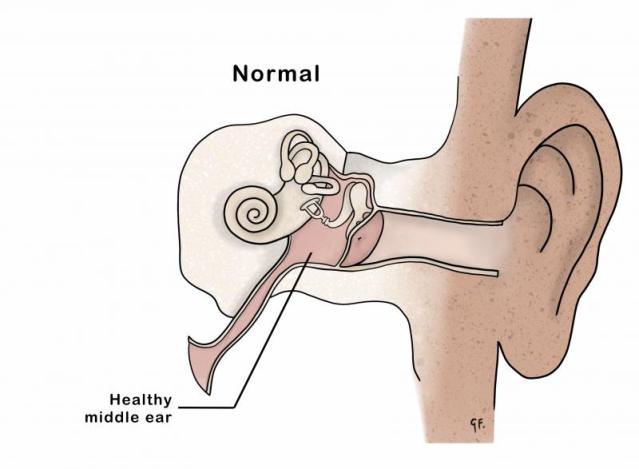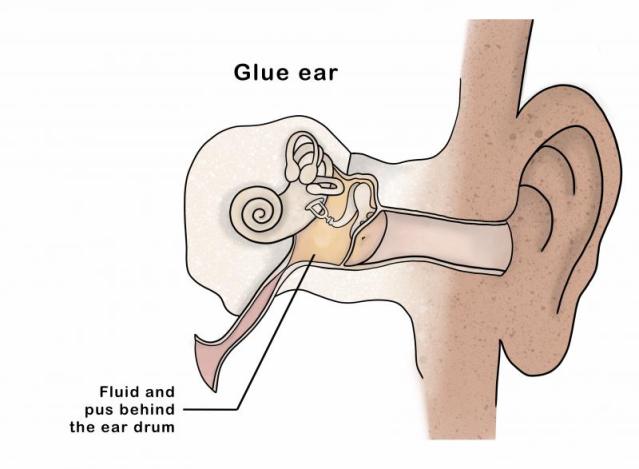Key points to remember about glue ear
Always see a doctor if you are worried about your child's hearing.
- children with glue ear have sticky fluid in their middle ear (the space behind the ear drum)
- glue ear can affect one or both ears
- the main symptom of glue ear is having trouble hearing
- hearing loss for long periods during the early years may affect speech and language development
- speak to your family doctor if you are concerned that your child may have glue ear
What is glue ear?
Glue ear happens when your child's middle ear is filled with fluid. The fluid is thick and sticky, like glue. Glue ear can affect one or both ears. It often follows an ear infection or can happen on its own.
The image below shows the inside of a normal ear.

The image below shows the inside of an ear with glue ear.

Check the information on ear infections for an explanation of how fluid can build up in the middle ear.
Read more about ear infections
After an ear infection, the fluid in the middle ear may stay around for weeks. This can happen even if your child has had antibiotics. The fluid clears up in 8 out of 10 children within 12 weeks. When there is still fluid for more than a couple of weeks, this is called glue ear.
The medical name for glue ear is OME (otitis media with effusion) or secretory otitis media.
Why is glue ear a problem?
For children to hear normally, their middle ear needs to be full of air. When there is fluid instead of air, it is harder for the ear drum to vibrate and carry the noise vibrations to the inner ear. This makes it harder for your child to hear. If both ears contain fluid, your child's hearing can be significantly reduced. Young children who have hearing loss for long periods can have problems with their speech and language development.
Read more about hearing problems in children
Find out about hearing and communication
What puts my child at risk of getting glue ear?
The risk factors for glue ear are the same as for ear infections.
What are the signs and symptoms of glue ear?
Children with glue ear are not usually unwell. Their only symptom may be hearing loss. Your child may fail a hearing test. Or, your doctor may discover glue ear when they are checking your child for another reason. It is always a good idea for you to make sure your family doctor checks your children's ears at every opportunity.
Hearing loss
The amount of hearing loss in children with glue ear varies. For your child, it can be like trying to hear with ear plugs in place - sounds are muffled.
Young children can't tell you about their hearing loss. If your child is not hearing well, they may:
- ask you to repeat things
- seem to ignore you or not answer when you speak to them
- not hear things properly
- want the volume turned up louder
- have delay in their language development
Behaviour problems
Reduced hearing may cause behaviour problems such as a lack of concentration or attention. Children may feel irritable if they keep missing out on what others are saying. Problems with speech and language development could be a sign of glue ear.
Sleep problems
Although the fluid does not usually cause pain, parents often say their child doesn't sleep well.
How is glue ear diagnosed?
Your doctor will talk with you about what's happening with your child.
Looking in your child's ears
They will look into your child's ears with an otoscope. An otoscope is a small powerful light with a magnifying lens.
Tympanometry
A tympanometer looks similar to an otoscope. It measures how well your child's ear drum moves back and forth. If there is fluid in the middle ear, the ear drum does not move.
Tympanometry is not a hearing test and a 'pass' on this test does not necessarily mean that your child can hear well - it just means that it is unlikely they have glue ear at the time of the test.
Hearing test
Sometimes, your doctor may recommend a hearing test for your child.
What is the treatment for glue ear?
The best treatment for glue ear is time. In most children, episodes of glue ear get better without treatment. For this reason, your family doctor may simply recommend regular checkups for up to 3 months so they can examine your child's ears.
If your child has fluid in the middle ear for more than 3 months, there are some treatment options.
Regular checkups
If your child's hearing and development are normal, your doctor may recommend this option. As your child gets older, they are less likely to have glue ear. This is because their eustachian tubes mature to work naturally. The eustachian tubes connect the middle ear of each ear to the back of the nose.
It is important to take your child to your doctor for regular checkups during this time.
Grommets
Some children with glue ear may need grommets. If your child does need grommets, your family doctor may recommend an appointment with an ENT (ear, nose and throat) specialist.
Other treatments for glue ear
Longer courses of antibiotics have been used in the past as treatment for glue ear. But, antibiotics only have a small temporary effect on clearing fluid from the middle ear. Because of this and concerns about the complications of long courses of antibiotics (including the development of antibiotic resistance, allergic reactions, diarrhoea and thrush), they are no longer a common treatment for glue ear.
The following treatments don't work - don't use these for your child:
- decongestants (such as Pseudoephedrine)
- antihistamines (such as Phenergan)
- steroids (such as Prednisone)
What can I do to help if my child has glue ear?
If your child has glue ear they may not be able to hear you. It can be helpful to get their attention before you speak to them. Remember to speak slowly and clearly to your child. Try to make sure your child can see your face when you are speaking to them and try to reduce background noise.
Let your child's teachers know that they may also need to get your child's attention before speaking, and that your child may need to sit at the front of the class to hear well. Glue ear is common and teachers are usually aware of the importance of making sure children hear well.
When should I seek help for my child with glue ear?
If you are concerned about your child's hearing or language development, see your family doctor.
Some areas have mobile children's ear clinics which visit schools and early childhood education centres. If your area has a mobile clinic, you could also talk to one of the ear nurse specialists. They are specially trained to diagnose, treat, monitor and refer for children with middle ear problems.
If your child has glue ear for more than 3 months or repeated episodes of glue ear, they should see an ENT (ear, nose and throat) specialist. The specialist may arrange a hearing test for your child.
If your child has had grommets and continues to have hearing or developmental issues, they may need a hearing test. They may also need to see a specialist again.
Acknowledgements
Starship Foundation and the Paediatric Society of New Zealand acknowledge the cooperation of Procare Health Ltd in the development of this content. Procare Health Ltd provides GP (general practice) services in the greater Auckland area.
Illustrations
Illustrations of ears by Dr Greta File. Property of KidsHealth.
